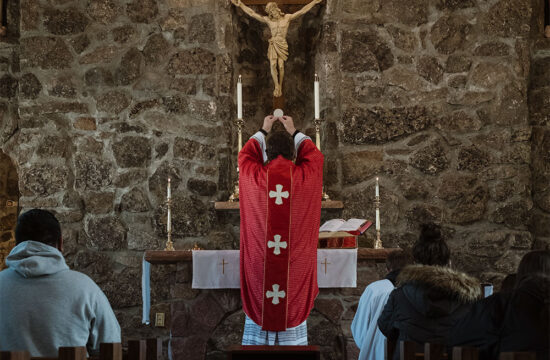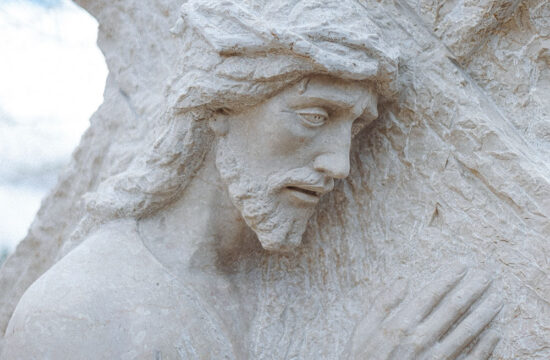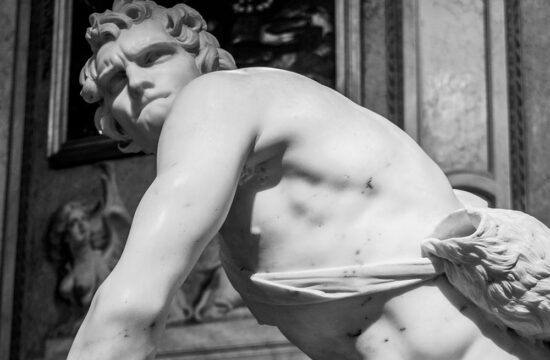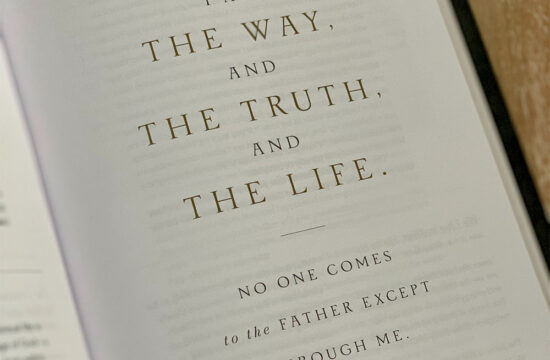DAY 258: Matthew 1-4; Proverbs 18: 17-20
FULFILLED
Don’t know how everyone else feels, but to me, these Messianic Checkpoints come at the perfect time! Nothing against Jeremiah, our (understandably) weepy prophet – but 52 chapters of that over the last month or so – I’m ready for a break! And jumping back into the New Testament with our week with the Gospel of St. Matthew seems a great way to do that.
You might remember that for St. Mark, we had discussed if you wanted to reduce the Gospel he authored to a word it would have been “immediately.” For St. Matthew, the word could be “fulfilled.” Matthew is writing from the vantage point of explaining how Jesus fulfills the entirety of the Old Testament. You get that from the opening words of it which greets us with one of our favorite things we’ve encountered in our biblical journey another genealogy! But thankfully having encountered them several times so far, we’re aware of their importance. How they connect all humanity into God’s very story of creation and in His story of re-creation: salvation. Even more, in this genealogy – we recognize one of the beautiful aspects of the mystery of the incarnation, God becoming Man, through a human family. And not just in the Holy Family of Joseph and Mary, but a dysfunctional, broken family of King David. As we hear all those different names (which hopefully are ringing some bells for us) we know all too well how broken and dysfunctional this truly is!
But in the “fullness of time” – God enters into that mess, that brokenness, that dysfunction. And initially, some might have been scandalized that His very presence doesn’t immediately “fix” everything. His birth (which might have surprised you, is covered very quickly here as we move from Christmas right to Epiphany in one verse!) Is immediately seen as a threat to the world and its worldly powers and influences – whether it’s in the threats of Herod, or the devil himself attempting to tempt Jesus as He prepares to begin His mission.
From the beginning, Matthew is making it clear, Jesus intends on confronting every element of evil that we encounter by experiencing it Himself: Whether it’s the fears of responding to God’s call (like we see St. Joseph contending with) – the governmental powers being so threatened by the very thought of this infant king that they respond with murderous, genocidal rage – the internal temptations every human being faces for power, authority and fame – God doesn’t just know it all, in Jesus, He enters into it… and conquers them, face to face. He will fulfill all God’s promises and show us how to experience the triumph that comes from that ourselves – by our following Him.
DAY 259: Matthew 5-7; Proverbs 18: 21-24
BLESSED ARE YOU
How did these chapters of the Gospel of Matthew hit you today? More than likely all of these passages are very familiar – the Beatitudes come up in the lectionary (readings at Mass) relatively often, the sections on almsgiving, prayer and fasting is our scripture for Ash Wednesday every year, and the verses that close out our reading today from Chapter 7 are some of the most quoted (Ask, Seek, Knock; Narrow gate) in how to live the Christian life.
But my curiosity stems from the reality of this being one long teaching. How many knew that this being a single, very loaded teaching? How hard is it to absorb all that Jesus is teaching?
One of the gifts, though, coming from our time together – as we’ve struggled with lengthy prophetic messages and proclamations, is imagining as a Jew hearing this for the first time. And continuing on what was mentioned yesterday Matthew’s focus on Jesus being “fulfillment” for the people.
These chapters aren’t breaking new ground in terms of what we’ve heard in the previous 258 days. In fact if you have your bibles, you will see notations on the bottom that point to other places in the bible where you can see references to what Jesus is teaching (and this isn’t an exhaustive list)
What is new is Jesus directing all of this to the individual. Yes there’s elements of this that could be heard and understood as being meant to a collective body, but there’s a directness of these teachings being personalized – I say to the one… do not let your right hand…blessed are you…
This is what is meant when we’ve said how in God becoming Man, in Jesus, God draws ever closer to humanity – to us… to me and you individually. Telling us He sees, knows, loves us. He understands the complexities and difficulties of life as He walks among us. And is calling us to holiness – by reaching out and inviting us into personal relationship with us.
As you listen (or read) these chapters, put yourself there at the feet of Jesus. Imagine Him speaking directly to you. Because He is.
DAY 260: Matthew 8-10; Proverbs 19: 1-4
BACK TO EDEN
Yesterday I kind of put out that question how did the entirety of Jesus’ teaching, which for the most part we’re used to hearing scriptural excerpts of rather than as a whole hit you. Today I found myself kind of blown away just reading these three chapters.
How many miracles took place in Matthew’s recounting of them? Just a quick summary: Healed a Leper; Heals a Centurions Servant; Heals Peter’s Mother in law (and many others) at Peter’s house; calms the storm at sea; exorcizes a demon; heals a paralytic; cures a woman suffering hemorrhages for twelve years; and then raises a little girl from death to life.
That’s quite a list. And interestingly in the midst of this, when the disciples experience a miracle themselves with the storm at sea, they ask “what sort of man is this, that even winds and sea obey him?” You might answer, the same one who did all the other amazing things recounted here 🙂
Or more seriously (and accurately) God Himself. That question is a bit deeper than just a reflection on that specific miracle at that particular moment. They’re recognizing Jesus didn’t just do something to get them out of that jam. THE WINDS AND THE SEA OBEY HIM. That’s going back to chapter 1. Not of Matthew of Genesis. They’re starting to see how limited their thoughts that Jesus is the Messiah, their declarations of “you are the Christ” – have been.
This point is repeated with Jesus speaking to the scribes in chapter 9 with the healing of the paralytic “that you may know the Son of Man has authority on earth to forgive.” For the scribes, that claim was more shocking than seeing this paralytic walk.
Yet the entirety of these chapters has me not only seeing Jesus as God Himself but the sense of bringing healing to the world… recreating His creation… Glimmers, glimpses of a return to the perfection of the Garden of Eden before the fall – where sickness, strife, brokenness didn’t exist. The powers of darkness are still at war, as we hear Jesus prepare his disciples for in Chapter 10 (and as we can testify in numerous demonstrable ways that make up books and chapters of our own) But we’re not to fixate or angst about those things. As we find ourselves in our own boats, the winds crushing us down and being swamped by the waves, Jesus asks “Why are you afraid, O men (and women) of little faith?”
DAY 261: Matthew 11-13; Proverbs 19: 5-8
UNFORGIVABLE SIN
Couched in between chapters filled with teachings, healings, exorcisms and some parables comes a few lines that have caused much discussion and intrigue for scholars and believers alike. Which makes sense when you think about it. Jesus, the incarnation of Mercy, speaking about an “unforgivable sin” would most definitely raise catch people’s attention and end up on their radar. What is it that could be so awful that the deep, bottomless ocean of forgiveness we’ve come to expect from Jesus would seem to run dry?
The key to understanding these two verses (Matt 12: 31-32) is the entire context happening here. Just a few verses earlier (24) the Pharisees accuse Jesus of casting out demons by demonic power. The illogic, the hardness of mind and heart to twist an obvious action of God into the complete opposite demonstrates a willful opposition to the Holy Spirit. This “blasphemy” can be seen when people feel entitled to remain in sin, when they refuse opportunities to convert. It’s the murderer on the death bed saying to the priest who’s come to offer him last rites and an opportunity to go to confession “God will never forgive me.” The reason it’s “unforgivable” is because God is honoring His gift of freedom to humanity.
It seems ludicrous to consider. But as we are living in a world that’s grown indifferent and more hostile to God, it’s a frightening proposition to consider – those who are mocking and openly rejecting Him in very public and outrageous ways. A few weeks ago Harvard University elected as it’s “chaplain” an avowed atheist. Much discussion has been had and much ink has been spilled by this as it seemed designed to mock Christians and anyone who is religious (since a “chaplain” by definition is someone who believes in God). But for us reading, listening and praying with the word of God, it’s a reminder of the importance for us to pray for this individual and the troubled, misguided souls encouraging this type of “forward thinking” – that their hearts will be softened and opened to seeing the error of their ways. That they will experience true conversion so that the ocean of Jesus’ mercy that we place our hope in, can be theirs as well.
DAY 262: Matthew 14-17; Proverbs 19: 9-12
WHY DID YOU DOUBT
Jesus walking on the sea has always fascinated me. Once again the disciples are in the boat, by themselves at night (this time without Jesus onboard asleep!). Once again the waves, the wind start to pick up – but this time instead of them being afraid of capsizing, it’s Jesus walking to them on the sea that the Gospel describes as “terrified” them. Despite Jesus’ identifying himself and telling them to have no fear, they still do.
What’s interesting to me is that the last time they were in a similar position doesn’t prevent those fears from re-emerging. In both experiences, Jesus is present to them. In both experiences, they are aware of His presence and want Him to do something. But when it’s not what they expected, they seem even more confused. The first time they’re frustrated Jesus is soundly sleeping and not freaking out like they are. This time they think He’s a ghost. Even in this instance where Jesus answers Peter’s request in the way he asks (demands?) “let me walk on the water” – that’s not enough to cure his disbelief.
This points to the reality that our faith, our hope, our love for Jesus have to be found in something more than miraculous experiences. It has to come from our recognition of who He is – God Himself; it has to come from our recognition of His presence right there in the storms of our lives; it has to be grounded in trust that He desires us to experience the fullness of life through Him both now and forever… That will only come, the fears will only truly recede when I surrender myself to Him. Yes, He’s the one who commands the winds and the seas, but He patiently waits for us to allow Him to command our hearts and souls.
DAY 263: Matthew 18-21; Proverbs 19: 13-16
THE LOST SHEEP
Of all the parables and images that Jesus uses to describe His mission, His vision, one of the most endearing and popular is of the Good Shepherd, who “lays down his life for His sheep.” It’s understandable why such a beautiful and comforting image of protection and selflessness has resonated even beyond farm-lands to people of every day and age.
One of those parables growing out of that imagery is “the parable of the Lost sheep” which we hear about in Matthew chapter 18. It hit me how just doing this Bible in a Year and immersing ourselves on a daily basis with Scripture (primarily the Old Testament) encountering this parable today, how this story speaks on so many levels. We’re probably familiar with the idea of it being a sinner, someone who has been rejected and isolated and feels God has forgotten them. Today was the first time I imagined “the sheep” being the people of God as a collective group – that the Lost sheep being “Israel.” Remembering the lengths that God has gone to search, to find, to rescue this one sheep – now being fulfilled in Jesus. As the drum beats of the Passion and Crucifixion grow louder, praying with this passage only heightens the impact of the passage.
I remember years ago in college, probably the first time I had to seriously study and discuss this in an academic setting, having a freedom to really think and talk about things in a different way. Up until then I would have been hesitant to even remotely sound critical of anything Jesus said. But with a faithful Catholic priest as our professor I remember saying “this does seem weird. You leave 99 for one? Is that something Shepherds would’ve actually done? I mean doesn’t that put the other 99 in jeopardy? Wouldn’t most Shepherds kind of “cut their losses” and just protect the 99 he has left?” My professor smiled, realizing I just threw a baseball straight over the plate for him, as he said “well that’s what makes Him a Good Shepherd…. He knows His sheep – and He loves them…. He’s worried about them all, but can’t stop worrying is the lost sheep hurt, frightened, is he being tracked by a wolf? He has to find His lost sheep. You’re right – there are others who would just focus on the 99…. In the views of the world it doesn’t make sense to leave the 99 in search of the one. Until you realize, Jesus is talking about you. You are the one He is searching after, worried about, cares for… You are the one He will lay down His life for. That’s what makes Jesus not just a Good Shepherd, but our Good Shepherd.
DAY 264: Matthew 22-24; Proverbs 19: 17-20
BELIEVING IN GOD
If you’re reading along in the Great Adventure Bible with these daily readings, you’ve encountered how the words of Jesus are highlighted by being printed in red ink. Well these three chapters there’s a lot of red ink. So there’s a lot to possibly choose from. But one section that stood out for me was Chapter 22: 29-33. This is probably not a section that gets highlighted a lot. Jesus is addressing the Sadducees, a sect of Jews that arose in the 2nd Century BC and dissolved within decades of Jesus’ life, death, resurrection and ascension. They had risen to influence in that short period of time becoming both political and religious leaders, many of whom were priests as well.
What makes them really stand out, somewhat shockingly though, is that they didn’t believe in any afterlife nor resurrection of the dead. It’s almost as if they are coming at their perspective of being Jewish strictly from a cultural, societal perspective. Embracing traditions (like honoring the high holy days) but not believing in anything spiritual behind those traditions. That’s their mentality when they’re coming at Jesus from that perspective with their question of the unfortunate bride who marries 7 brothers in succession as each previous brother dies. Jesus not suprisingly, doesn’t mince words with them. He dismisses the hypothetical question by pointing out how “you know neither the Scriptures nor the power of God.”
This is one of those times that reading (or listening) to the scriptures can’t quite capture what a stir this was. Matthew describes the crowd as being “astonished.” Jesus has addressed the elephant in the room. By saying they “don’t know” it’s not that they’re unfamiliar with the religious texts that have been passed down for centuries – it’s more they don’t believe… in the scriptures, and even more tragically – the power of God.
It’s uncomfortable to consider these Jewish authorities, these leaders not believing… What made me stop and zero in on this is the reality that it’s probably even more uncomfortable for us to consider that there could be some of our own religious authorities and leaders – clergy or lay – falling into that same category. This isn’t to scandalize anyone – when we just look at some of the horrendous abuses to children that have taken place in the Church… you have to imagine that they “know neither the Scriptures nor the power of God.”
This scene sets the stage for Jesus to definitively lay down “the First Commandment.” For the Jews who over the entirety of the development of the Torah had amassed 600+ “laws” this was an ongoing theological debate among Rabbis. Asking them “what was the most important thing for the Jews to be focused on.” Post-exile, now having their homeland being occupied by a hated enemy force (the Romans) where they were for all intents and purposes as enslaved as they had been under Egypt – those debates could easily drift off in a variety of directions: what was essential for them as a people to survive? Which religious obligations were non-negotiable? How to negotiate that with this pagan empire? How their being occupied/in some ways cooperating impacted their purity laws?
Jesus cuts through all of that with calling them back to what’s most essential: Love the Lord your God with all your heart, and with all your soul, and with all your mind… And a second is like it, You shall love your neighbor as yourself.
Nothing matters – within religious practice, within life itself – if God is not at the heart of it. Another example of the timelessness of scripture: It was true then… as it is now.
DAY 265: Matthew 25-26 ; Proverbs 19: 21-24
WHAT IS JESUS WORTH TO YOU
Here’s a challenging question to reflect on: What is Jesus worth to you?
As the Cross looms in the near future for Jesus, Matthew seems to be drawing attention to that question by highlighting some of answers from the people of Jesus day and age:
For the chief priests, elders – He was worth nothing, as they conspired together to have Him killed…
For Judas He was worth thirty pieces of silver (Matthew 26: 15) comparable to 4 months salary…
For the other apostles and followers – He was worth their leaving their lives behind and following Him, but the depth of that commitment was about to be tested.
For this one anonymous woman, Jesus is worth an alabaster jar of very expensive ointment (Matt 26:7) It’s a curious episode isn’t it? In the midst of all these other “estimations” of the worth of Jesus, the details that we have and we don’t. We know this happens at the house of Simon the leper – but we don’t know her name. The gesture itself is profoundly moving and intimate – it’s a gesture of kindness, sincerity, and love. This nameless woman demonstrates an incredible sense of attention and compassion to what’s about to happen to Jesus. Meanwhile the disciples whom Jesus loves who He’s said multiple times what’s about to happen to Him continue to seem oblivious (well intentionally or not) as they dismiss her act. Calling it a “waste.” Here she has possibly offered all that she had left of value to Jesus and for a moment is feeling judged as foolish.
But not to Jesus. As the oil dripped from his face, as the fragrance from the ointment filled the room, He purposefully stops the conversation dead in its tracks. She may remain an unknown figure to us, but Jesus says “wherever this gospel is preached in the whole world, what she has done will be told in memory of her.”
This one act of unabashed selfless, generous love is forever captured in our scriptures. This hidden disciple highlights that when we reflect on what Jesus is worth to us, when we bring all that we have and offer it to Him, it is seen, it is received, it is remembered.
DAY 266: Matthew 27-28 ; Proverbs 19: 25-29
GO TO GALILEE
At some point during this Bible Journey, we discussed how while we obviously find similarities and overlapping in the Gospels in sharing the life, death, resurrection of Christ, each of the Gospels has its own, in a sense, “character.” Hopefully, you’ve been able to appreciate and pick that out for yourself. John, “the beloved disciple” writing his Gospel the last, had more time for reflection in composing his chapters… Mark is thought to have been St. Peter’s “assistant” and his writings almost sound like him recounting Peter’s testimonies and sermons about Jesus. You could’ve picked some of those traits in how they recount the Resurrection. John lets us know that he outran Peter to the empty tomb (but waited outside and let him enter first, respecting Peter’s being named the first Pope by Jesus Himself) before sharing some details of encounters that occurred in the 40 days that followed Jesus’ resurrection. For Mark/Peter the empty tomb is evidence enough of this unprecedented event in the history of humanity – Jesus being raised from the dead. The Gospel of Mark kind of ends suddenly wanting us to long for more information – which is intentional. We encounter the risen Christ through the preaching, through the activity of the Church commissioned by Jesus Himself.
For Matthew, the line that stands out and, to be honest with you all, can move me to tears is the Risen Jesus’ words to Mary Magdalene. “Do not be afraid; go and tell my brethren to go to Galilee, and there they will see me.” Think about what’s happening here. The betrayals, the failures that preceded the Passion, the torture, the death of Jesus have utterly devastated his apostles, his disciples. Their hearts and minds have been completely wrecked by all that’s happened. So what does Jesus instruct them to do? How are they going to be prepared to encounter Him in His glorious, resurrected body?
They have to go back to the beginning. To Galilee. Where there was that dividing line for them of “before” and “after” they first met Jesus. The place where fishermen became fishers of men. Where a tax collector named Matthew the voice of the Lord calling him by name to let go of the riches, comfort, and security he had as a tool of the Roman empire manipulating this “traitor to the Jews” which was also a life of isolation, of brokenness he was living – to let all of that go and follow Him. To return to the beginning of Jesus’ ministry – the preaching, the teaching, the miracles. Go to Galilee – remember where you first met Jesus, you first experienced the love that knew you before you were born and completely changed your life. Go there and you can see the Cross, the Resurrection, everything in this new light, new life. A new life that they too will receive that will make them fearless. Do not be afraid.
In a sense, Matthew ends his gospel with the charge for each of us to return to the beginning as well. For each of us to “go to Galilee” as well. What are some of those momentous times of encounter where Jesus upended your life? That you can see a dividing line of “before” and “after.” How is He calling you to not be afraid, to remember how He saw you and called you by name – and How the Risen Jesus Christ is saying right now, I am here with you – see me.











